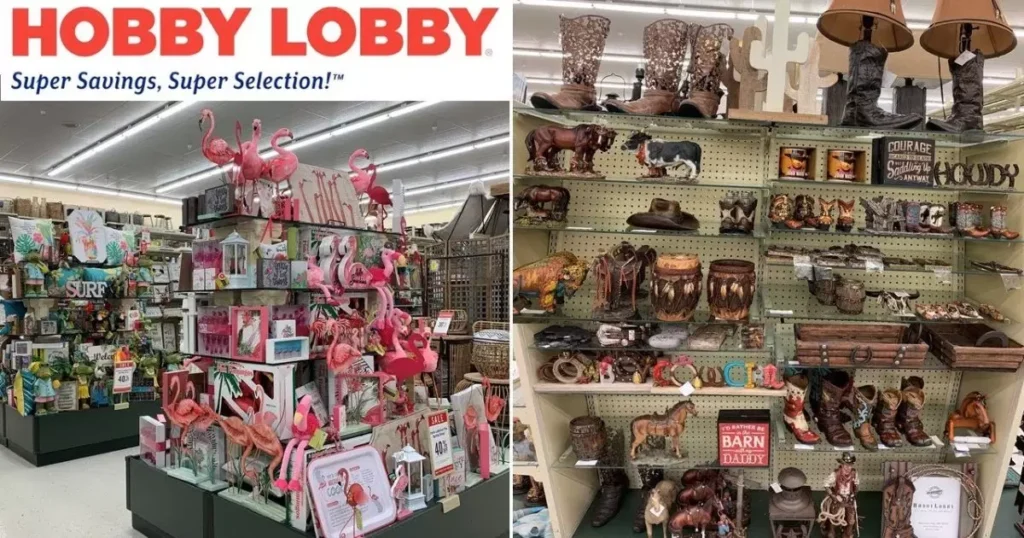Introduction:
Hobby Lobby is not going out of business but is actively addressing challenges through customer experience enhancements and supply chain improvements.
Hobby Lobby is a well-known arts and crafts store in the United States. It offers a wide variety of craft supplies, home decor, and seasonal decorations. Recently, there have been rumors about the company going out of business.
Hobby Lobby is a beloved arts and crafts retailer in the United States. Known for its wide range of craft supplies, home décor, and seasonal decorations, Hobby Lobby has built a strong customer base over the years. However, recent rumors have sparked concerns about the company’s future.
This has raised many questions among customers and employees. In this article, we will explore the current situation of Hobby Lobby.If you love shopping at Hobby Lobby, stay informed about their latest news and updates.
This article will explore whether Hobby Lobby is going out of business by examining its financial performance, business decisions, and industry trends.
Overview of Hobby Lobby

Hobby Lobby is a privately-owned retail company founded in 1972 by David Green. The company started as a small picture frame business and has grown into a major arts and crafts retailer with over 900 stores across the United States.
Hobby Lobby is known for its large selection of craft supplies, home décor items, and seasonal decorations. The company is also recognized for its commitment to Christian values, closing all its stores on Sundays to allow employees to rest and spend time with family.
History and Growth
Hobby Lobby’s journey began in a garage in Oklahoma City, where David Green started making miniature picture frames. By 1975, the first Hobby Lobby store was opened, and the company quickly expanded throughout the 1980s and 1990s.
Key milestones in Hobby Lobby’s growth include the introduction of large-format stores, the addition of new product categories, and the expansion into new markets. The company’s success can be attributed to its focus on customer satisfaction, competitive pricing, and a wide variety of products.
Financial Performance
Hobby Lobby has experienced significant financial growth over the years. The company has consistently reported strong sales figures, driven by its extensive product range and loyal customer base.
In recent years, however, the retail industry has faced numerous challenges, including economic downturns and shifts in consumer behavior. Despite these challenges, Hobby Lobby has maintained a solid financial position, thanks to its strategic business decisions and efficient operations.
Impact of COVID-19
The COVID-19 pandemic had a profound impact on the retail industry, and Hobby Lobby was no exception. During the early stages of the pandemic, many Hobby Lobby stores were forced to close temporarily due to lockdown measures.
This led to a significant decline in sales and disrupted the company’s supply chain. However, Hobby Lobby adapted by enhancing its online presence and implementing safety measures in stores. The pandemic also led to a surge in DIY and craft activities, which helped boost sales once stores reopened.
Recent Business Decisions

Hobby Lobby has made several strategic business decisions in response to changing market conditions. One notable decision was the investment in e-commerce and digital marketing to better serve customers who prefer shopping online.
The company has also focused on optimizing its supply chain to reduce costs and improve efficiency. Additionally, Hobby Lobby has continued to expand its product offerings, introducing new categories such as home organization and outdoor décor.
Store Closures and Layoffs
In recent years, Hobby Lobby has closed a few underperforming stores as part of its efforts to streamline operations. These closures were strategic moves to ensure the company’s long-term sustainability.
While store closures and layoffs can be concerning, it is important to note that Hobby Lobby continues to open new stores in promising markets. The company remains committed to providing employment opportunities and serving its customers nationwide.
Competitors in the Market
Hobby Lobby operates in a competitive market with several other major players in the arts and crafts retail space. Key competitors include Michaels, Joann Stores, and AC Moore. These companies offer similar products and target the same customer base.
To stay competitive, Hobby Lobby differentiates itself through its extensive product range, competitive pricing, and commitment to customer service. The company also benefits from its strong brand reputation and loyal customer base.
Consumer Perception
Hobby Lobby enjoys a positive reputation among its customers, who appreciate the wide variety of products and competitive prices. The company’s commitment to Christian values resonates with a significant portion of its customer base.
Hobby Lobby has faced criticism and controversy over some of its business practices and legal battles. Despite this, the company continues to maintain a loyal following and high customer satisfaction ratings.
Management Statements
Hobby Lobby’s management has been vocal about the company’s commitment to growth and sustainability. In various statements, the company has emphasized its focus on adapting to changing market conditions and enhancing customer experience.
Management has also highlighted the importance of maintaining strong financial health and investing in the company’s future. These statements reflect Hobby Lobby’s proactive approach to navigating challenges and seizing opportunities.
Industry Trends

The arts and crafts industry has undergone significant changes in recent years. Key trends include the rise of online shopping, increasing demand for personalized and DIY products, and a growing interest in sustainable and eco-friendly materials.
Hobby Lobby has responded to these trends by expanding its online presence, introducing new product lines, and promoting eco-friendly options. The company’s ability to adapt to industry trends is crucial for its continued success.
Future Outlook
Looking ahead, Hobby Lobby is well-positioned to navigate the challenges and opportunities in the retail industry. The company’s strong financial foundation, strategic business decisions, and loyal customer base provide a solid platform for future growth.
While uncertainties remain, particularly in the post-pandemic landscape, Hobby Lobby’s proactive approach and commitment to innovation will be key drivers of its long-term success.
Summary of Findings
In summary, the rumors about Hobby Lobby going out of business are not supported by current evidence. The company has demonstrated resilience in the face of challenges and continues to make strategic decisions to ensure its sustainability.
While store closures and layoffs have occurred, these moves are part of a broader strategy to streamline operations and focus on growth. Hobby Lobby remains a strong player in the arts and crafts retail industry.
How To Start A Food Business?
Customer Experience Enhancements
Hobby Lobby has been actively working to improve the in-store shopping experience to better serve its customers. Recent updates include store layout redesigns to make product navigation easier and more intuitive.
These changes are aimed at enhancing the shopping environment and making it more enjoyable for customers.In response to the growing demand for online shopping, Hobby Lobby has invested in upgrading its e-commerce platform. Improvements include a more user-friendly website, faster checkout processes, and better customer support.
These enhancements are designed to offer a seamless online shopping experience that matches the quality of in-store interactions.Hobby Lobby has introduced or revamped its loyalty programs to reward frequent shoppers.
These programs often include discounts, exclusive offers, and early access to sales. By providing additional value to loyal customers, Hobby Lobby aims to boost customer retention and satisfaction.
Product Supply Chain Issues
Like many retailers, Hobby Lobby has faced supply chain disruptions in recent years. These disruptions have been caused by various factors, including global trade issues and the COVID-19 pandemic.
As a result, the company has experienced challenges in maintaining product availability and managing inventory levels.To address supply chain issues, Hobby Lobby has worked on strengthening its supplier relationships. This involves renegotiating contracts and diversifying its supplier base to reduce dependency on a single source.
By improving these relationships, the company aims to enhance supply chain resilience and ensure a more reliable flow of products.Hobby Lobby has implemented several mitigation strategies to tackle supply chain challenges.
These include increasing inventory levels for key products, improving logistics efficiency, and investing in technology to better forecast demand. These strategies are intended to minimize the impact of disruptions and maintain a steady supply of products for customers.
Expansion and Market Penetration
Hobby Lobby has been exploring opportunities for new market entries to expand its presence. This includes opening new store locations in untapped regions and increasing its footprint in existing markets.
By expanding its geographical reach, Hobby Lobby aims to attract new customers and grow its market share.In addition to opening new stores, Hobby Lobby has experimented with store format changes.
This includes adjusting store sizes and layouts to better suit different markets and customer preferences. These changes are designed to optimize the shopping experience and increase operational efficiency.To accelerate growth, Hobby Lobby has considered franchise opportunities.
Franchising allows the company to expand more rapidly by leveraging the resources and local knowledge of franchisees. This approach helps Hobby Lobby enter new markets with lower financial risk and greater local insight.
Additional Tips
- Follow Hobby Lobby on social media for the latest updates and promotions.
- Sign up for the Hobby Lobby newsletter to receive exclusive deals and news.
- Check the Hobby Lobby website regularly for new product arrivals and discounts.
- Visit Hobby Lobby stores during sales events to take advantage of special offers.
- Join Hobby Lobby’s customer loyalty program for additional savings and benefits.
- Use Hobby Lobby’s mobile app for easy shopping and to stay informed about store events.
- Take advantage of seasonal sales and clearance items for significant savings.
- Participate in Hobby Lobby’s craft workshops and events to learn new skills and meet fellow enthusiasts.
Pro and Cons in Table
| Pros | Cons |
| Wide variety of products | Some stores have closed |
| Competitive pricing | Controversies and legal battles |
| Strong customer loyalty | Competition from other retailers |
| Commitment to Christian values | Economic challenges in retail sector |
| Investment in e-commerce | Supply chain disruptions |
Answer to Key Question
Q1: Why have some Hobby Lobby stores closed?
A: Hobby Lobby has closed some underperforming stores as part of its efforts to streamline operations and focus on more promising markets.
Q2: How has Hobby Lobby adapted to the impact of COVID-19?
A: Hobby Lobby enhanced its online presence, implemented safety measures in stores, and saw a boost in sales due to increased interest in DIY and craft activities.
Q3: What sets Hobby Lobby apart from its competitors?
A: Hobby Lobby differentiates itself through its extensive product range, competitive pricing, commitment to Christian values, and strong customer service.
Q4: What is Hobby Lobby’s future outlook?
A: Hobby Lobby is well-positioned for future growth, with a strong financial foundation, strategic business decisions, and a loyal customer base.
Q5: How can customers stay updated on Hobby Lobby’s latest news?
A: Customers can stay informed by following Hobby Lobby on social media and regularly checking their official website for updates and promotions.
Conclusion
Hobby Lobby is not going out of business. The company continues to adapt to changing market conditions and make strategic decisions to ensure its sustainability.
While there have been challenges, Hobby Lobby’s strong financial foundation, loyal customer base, and proactive management approach position it well for future success.
Customers can continue to enjoy shopping at Hobby Lobby and support the company as it navigates the evolving retail landscape.

Hi, I’m Amaliyah-Richard! I’m a dedicated author at Skyvoxes. I hold a Bachelor’s degree in Business, and I love writing about all things business. My aim is to make complex business topics easy to understand and accessible for everyone. Whether you’re a seasoned professional or just starting out, I hope my articles provide you with valuable insights and practical advice.










